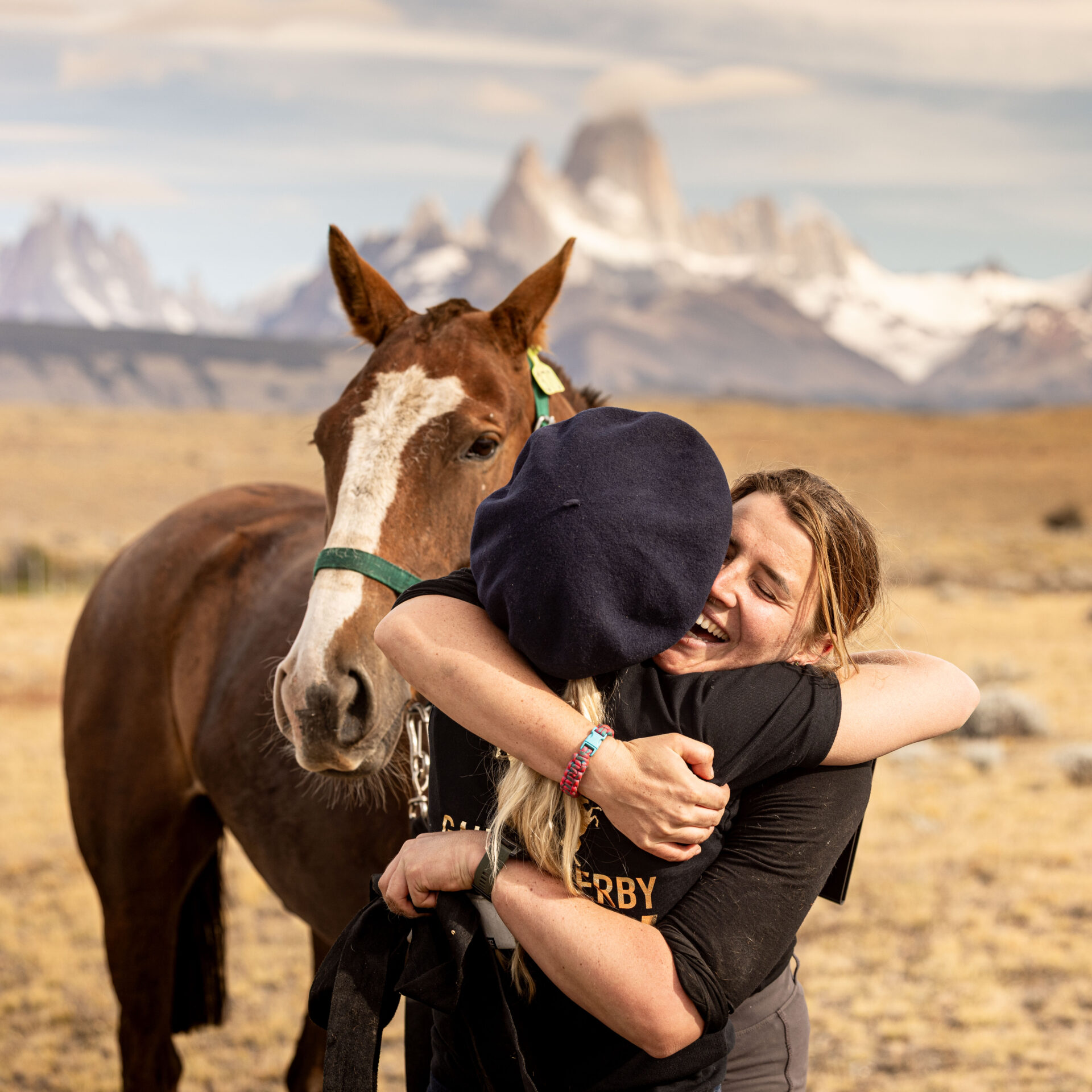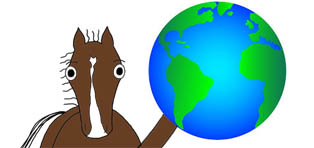Thursday, September 04, 2003
Horses in Alberta
>On Behalf Of Mike Sherrell
August horse news
We spent August around Edmonton in Central Alberta, at the northern end of
the Great Plains, looking for flat pretty gaiting out of the heat of the
California summer, hoping for archetypal grasslands to wander or endless
dirt tracks through the north woods into our dreams as the ends of our lives
get nearer.
Thunderstorms roll through almost weekly, it seems, so in August when
California's dessicated yellow is getting as tiresome as the snow of
February must be in Canada, it's an inviting green, huge lawns of mown crops
and roadsides that make English country estate grounds seem like cramped
wannabes. The footing is excellent to good, lovely black alluvial dirt. But
the grasslands are cut into rectangles, sides running north-south and
east-west, in 80- and 160-acre blocks. Around many of them are fences to
keep the cattle, horses or sheep in, and around almost all of them are roads
for cars, often paved and in almost every other case wide, graded and
gravelled. West of Edmonton I did find the Jack Pine Provincial Grazing
Reserve, a big unfenced section of land to ride, and with a lot of effort
could imagine the freedom of riding as Arnold Rojas says the Spanish found
the New World, "half a world to ride across." But the cattle had had their
way with it, the brush and low tree limbs chewed, cow pies strewn across the
ground, bare dirt showing through the stubble. Not as bad as the grazed
parts of Pt. Reyes, because it was rolling and allowed riding in any
direction.
On the edge of the grasslands, between the prairie and the boreal forest,
as the ecologists call it, there is a zone called the aspen parklands. We
have never found more beautiful riding. Tall, slender, white-barked trees,
sometimes half golden in the long evening sun at the solstice it sets at
10:30 with a trail or track winding through like Hansel and Gretel or the
dream of our forgotten ancestors. Have you ever noticed that the paso gaits
at about the speed of a butterfly? The forest has elk and foxes and wild
strawberries and blueberries, and other berries you can pick from horseback.
We haven't found the endless trail, but we found some that were longer than
the horses were yet conditioned to ride, at Ft. Assiniboine Sandhills
Wildland Provincial Park, Cooking Lake/Blackfoot Provincial Recreation Area,
Old Edmonton Trail in Sherwood Park, and (so far the best) Miquelon Lake
Provincial Park, where the trails are wherever there are no trees, and you
either need a GPS to get home, a lot of spare daylight, or an exceptional
sense of direction (and where the skull of a missing, presumed murdered,
prostitute was turned up last week).
The undergrowth in the aspen woods is impassible, but frequently there is a
lake or pond to be seen near the trail, often created by a beaver dam, their
lodge visible in the middle of it. The view then, just yards away, is
beautiful and inaccessible. These unattainable sights, sacred in their way,
framed by the white pillars of the aspen, reminded me of European church
architecture, unreachable ceilings and altars, gilt or marble, carved or
painted by masters, to be gazed at, to inspire longing for their beauty,
proffering the prospect of a union with the holy. I should have seen the
forest before going to Europe, because man learned what was beautiful from
looking at nature first, and the medieval church builders were much closer
to nature than we are, and it would be better if the churches reminded me of
the forest rather than vice versa.
At Ft. Assiniboine part of the trail system follows the old Yukon Trail.
But this is where it starts to get hilly, and the only ideal, flat part is a
few miles along the Athabasca River. We stabled the horses for a night at
the Horse Creek Ranch, a dude ranch which caters to Dutch and Belgian
tourists the owner picks up from training stables he's connected to in the
Low Countries. The people we met there had all been taking riding lessons in
Europe and were adequate to the quiet quarter horses of the ranch, but were
intrigued by our Peruvians. We let some of them ride, and one beanstalk of a
guy with legs too long for the stirrups and who said he'd taken the Pat
Parelli clinic, apparently very modish in Europe just now, was immediately
whizzing along on Grandiosa in fine gait, his legs dangling and not bouncing
at all.
Southeast of Ft. Assiniboine is the Whitecourt area, where the guide book
says there's lots of hiking but nowhere to hike to. That grabbed my
attention, because it sounded like all there was to do was wander through
the woods, in hopes of which I came all this way. Whitecourt bills itself as
the Snowmobile Capital of the World, and has scores of miles of snowmobile
track cut through the aspen forest. We scoped it out for future reference,
and found all kinds of entrances to the forest beckoning from alongside the
road. Some of these possible routes were "cutlines": Alberta is hydrocarbon
country, and the forest is sliced through with what are also sometimes
called seismic lines, straight lines cut through the woods for a couple of
miles, apparently at random, I gather as part of the oil prospecting
procedure. (It is said that oil prospectors are the profession most likely
to be grizzly fare.)
Canadian horse news: Grandiosa got galled by the cinch, so we've been
switching cinches and saddlepads it's possible that once the sore was
opened, it was kept open by irritation from the square front corners of the
Peruvian saddlepad we'd been using under Jean's expensive endurance saddle
and learning about different balms and antibiotics and salves and ointments
and potions and nostrums. Aquaralia started fighting the bit, perhaps
because she hadn't had a gradual enough introduction to it, perhaps because
this particular bit had something about it that bugged her, perhaps because
she's a horse that is just idiosyncratically unsuited to bitting, perhaps
because I'm not sensitive enough with bitted horses. I put her in Dale
Downey's hand-knotted Peruvian rope bozal, and she immediately became calm.
Now it remains to be seen whether a) she'll stay calm, and b) I can keep her
collected and in gait. She immediately started carrying her poll two or
three inches below where it was when she wore the bit and is understepping a
good eight inches. This is truly a difficult horse, but willing and sturdy
and worth a lot of trouble.
I may find the open grasslands or endless trail yet, in Wood Buffalo
National Park, home of the biggest free-ranging buffalo herd in the world,
or in Peace River country. The winter road from Ft. McKay to Ft. Chipewyan
is 100 unpaved miles, but I found out it's all sand, which would make it too
much of a slog for me, and in any case is heavily traveled by ATVs,
apparently since the big oil sands projects opened and brought up all these
blue collar motorheads. Too bad; the main roadside attractions are
apparently Indian villages.
But our last weekend, since we'd finally got the girls shod front and back,
I was able to try Aquarelia on 6 or 8 miles of the quiet, lightly travelled
gravelled roads that grid the entire agricultural zone of the province. The
gravel is marble size and smaller, and rounded, not jagged. You can almost
always find a line that keeps you in half an inch of gravel or deeper, so it
's not concussive and is conducive to the foot sliding when it hits
Aquaralia's hind shoes soon got sanded smooth and shiny. At the gait the
farmscape drifts by picturesquely big sunshiny bales, vast undulating
fields of yellow wheat or golden something safflower?, combines mowing,
trains, windbreak lines of trees, cattle, horses, flocks of crows pecking up
grasshoppers, etc., etc. From the map I think I could pick out at least 50
and possibly several hundred continuous miles of this sort of road, and
there are at least some little towns with motels that might be accessible
even the paved roads usually have huge shoulders, a hundred feet wide and
more, usually mown grass or crops that can be negotiated. There are
farmsteads every mile or so, almost always with livestock and thus feed. It
seems that the ingredients for horseback travel may be present.
On one of the very first rides, to the Blackfoot Trail, we encountered a
thoroughbred that was dancing around uncontrollably, and which swung around
suddenly and kicked Aquaralia. The kick was so hard that Aquaralia was
driven into my opposite thigh hard enough to bruise the inside of it.
Unfortunately Aquarelia was shielded by my ankle, which had to go into a
cast for the rest of the month. I brought the stirrup in to the doctor to
make sure the cast wouldn't be too big to go in, and fortunately the doctor
left enough of my toes free to let me spring into the saddle as usual, once
I'd got used to it. Every horse person I met asked me what happened, so I
was glad it was a horse accident. Anyway, the kick took place several miles
out in the woods, and gave me the curiously pleasureable realization that I
unable to get home except on my horse.
Back home in California, the bad news is that Grandiosa is still, after 12
months, lame in her left hind. DLSD is not ruled out, but the fact that it's
so far not bilateral would seem to militate against it. Julio Soto Jr. has
restored Traveller's gait, so all that remains is for me not to destroy it
again. Sherry Fairchild let me ride Dancer, who we bred 8 years ago and who
I like very much. She needs to have her head brought up; I could force her
into collection and make her gait, but it was hard for her and she got tired
and really didn't like it after just five or ten minutes. If Traveller weren
't all ready to go I'd love to work on Dancer. She's real smart,
hypersensitive and huge for a mare.
Mike Sherrell
Grizzly Analytical (USA)
707 887 2919/fax 707 887 9834
www.grizzlyanalytical.com
Subscribe to:
Post Comments (Atom)
Gaucho Derby 2026 – Race Day 8 – Full Send. Winners Crowned.
Equestrianists.com - Full Story Stevie Delahunt 26th February 2026 Yeeeehawww!!! If you were anywhere near that finish line today you ei...

-
Inside.fei.org 17 December 2020 The FEI Board took a series of key decisions on allocation, cancellation, and reopening of bids for FEI C...
-
Michael Pollard was one of the four winners of the 2025 Mongol Derby (Kathy Gabriel) Ca.News.yahoo.com - Full Article Annabel Grossman ...
-
BNA.bh - Full Article 17 Aug 2025 London, Aug. 17 (BNA): His Highness Shaikh Nasser bin Hamad Al Khalifa, Representative of His Majes...


No comments:
Post a Comment